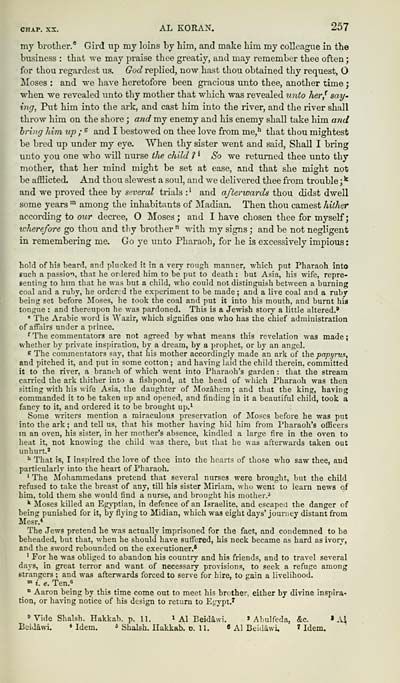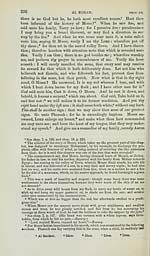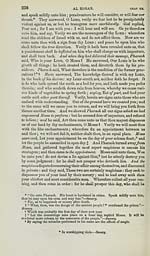Download files
Complete book:
Individual page:
Thumbnail gallery: Grid view | List view

CHAP. XX. AL KORAN. 257
my brother.* Gird up my loins by him, and make him my colleague in the
business : that we may praise thee greatly, and may remember thee often ;
for thou regardest us. God replied, now hast thou obtained thy request, O
Moses : and we have heretofore been gi-acious unto thee, another time ;
when we revealed unto thy mother that which was revealed unto her,^ say.
inj, Put him into the ark, and cast him into the river, and the river shall
throw him on the shore ; a7id my enemy and his enemy shall take him and
bring him up ; ^ and I bestowed on thee love from me,*^ that thou mightest
be bred up under my eye. When thy sister went and said, Shall I bring
unto you one who will nurse the child ?^ So \fe returned thee unto thy
mother, that her mind might be set at ease, and that she might not
be afflicted- And thou slewest a soul, and we delivered thee from trouble j'^
and we proved thee by several trials : ' and afterwards thou didst dwell
some years ™ among the inhabitants of IMadian. Then thou camest hither
according to our decree, O Moses ; and I have chosen thee for myself;
u-herefore go thou and thy brother " with my signs ; and be not negligent
in remembering me. Go ye unto Pharaoh, for he is excessively impious :
hold of his beard, and plucked it in a very rough manner, which put Pharaoh into
such a passion, that he onlered him to be put to death : but Asia, his wife, repre-
Benting to him that he was but a child, who could not distinguish between a burning
coal and a ruby, he ordered the experiment to be made ; and a live coal and a ruby
being set before Moses, he took the coal and put it into his mouth, and burnt his
tongue : and thereupon he was pardoned. This is a Jewish story a little altered.'
• The Arabic word is Wazir, which signifies one who has the chief administration
of affairs under a prince.
^ The commentators are not agreed by what means this revelation was made ;
whether by private inspiration, by a dream, by a prophet, or by an angel.
8 The commentators say, that his mother accordingly made an ark of the papyrua,
and pitched it, and put in some cotton ; and having laid the child therein, committed
it to the river, a branch of which went into Pharaoh's garden : that the stream
carried the ark thither into a fishpond, at the head of which Pharaoh was then
sitting with his wife Asia, the daughter of Mozahem ; and that the king, having
commanded it to be taken up and opened, and finding in it a beautiful child, took a
fancy to it, and ordered it to be brought up.^
Some writers mention a miraculous preservation of Moses before he was put
into the ark; and tell us, that his mother having hid him from Pharaoh's officers
m an oven, his sister, in her mother's absence, kindled a large fire in the oven to
lieat it, not knowing the child was there, but that he was afterwards taken out
unhurt.'
'' That is, I inspired the love of thee into the hearts of those who saw thee, and
particularly into the heart of Pharaoh.
' The Mohammedans pretend that several nurses were brought, but the child
refused to take the breast of any, till his sister Miriam, who went to learn news of
him, told them she would find a nurse, and brought his mother.^
^ Moses killed an EgA^jtian, in defence of an Israelite, and escaped the danger of
being punished for it, by flying to Midian, which was eight days' journey distant from
Mesr.*
The Jews pretend he was actually imprisoned for the fact, and condemned to be
beheaded, but that, when he should have suffered, his neck became as hard as ivory,
and the sword rebounded on the executioner.*
' For he was obliged to abandon his country and his friends, and to travel several
days, in great terror and want of necessary provisions, to seek a refuge among
strangers ; and was afterwards forced to serve for hire, to gain a livelihood.
" I. e. Ten.«
° Aaron being by this time come out to meet his brother, either by divine inspira-
tion, or having notice of his design to return to Egypt.'
'Vide Shalsh. Hakkab. p. 11. i Al Beidawi. ' Abulfeda, &c. » Ai
Beidawi. * Idem. * Shalsh. Ilakkab. d. 11. « Al Beidawi, ' Idem.
my brother.* Gird up my loins by him, and make him my colleague in the
business : that we may praise thee greatly, and may remember thee often ;
for thou regardest us. God replied, now hast thou obtained thy request, O
Moses : and we have heretofore been gi-acious unto thee, another time ;
when we revealed unto thy mother that which was revealed unto her,^ say.
inj, Put him into the ark, and cast him into the river, and the river shall
throw him on the shore ; a7id my enemy and his enemy shall take him and
bring him up ; ^ and I bestowed on thee love from me,*^ that thou mightest
be bred up under my eye. When thy sister went and said, Shall I bring
unto you one who will nurse the child ?^ So \fe returned thee unto thy
mother, that her mind might be set at ease, and that she might not
be afflicted- And thou slewest a soul, and we delivered thee from trouble j'^
and we proved thee by several trials : ' and afterwards thou didst dwell
some years ™ among the inhabitants of IMadian. Then thou camest hither
according to our decree, O Moses ; and I have chosen thee for myself;
u-herefore go thou and thy brother " with my signs ; and be not negligent
in remembering me. Go ye unto Pharaoh, for he is excessively impious :
hold of his beard, and plucked it in a very rough manner, which put Pharaoh into
such a passion, that he onlered him to be put to death : but Asia, his wife, repre-
Benting to him that he was but a child, who could not distinguish between a burning
coal and a ruby, he ordered the experiment to be made ; and a live coal and a ruby
being set before Moses, he took the coal and put it into his mouth, and burnt his
tongue : and thereupon he was pardoned. This is a Jewish story a little altered.'
• The Arabic word is Wazir, which signifies one who has the chief administration
of affairs under a prince.
^ The commentators are not agreed by what means this revelation was made ;
whether by private inspiration, by a dream, by a prophet, or by an angel.
8 The commentators say, that his mother accordingly made an ark of the papyrua,
and pitched it, and put in some cotton ; and having laid the child therein, committed
it to the river, a branch of which went into Pharaoh's garden : that the stream
carried the ark thither into a fishpond, at the head of which Pharaoh was then
sitting with his wife Asia, the daughter of Mozahem ; and that the king, having
commanded it to be taken up and opened, and finding in it a beautiful child, took a
fancy to it, and ordered it to be brought up.^
Some writers mention a miraculous preservation of Moses before he was put
into the ark; and tell us, that his mother having hid him from Pharaoh's officers
m an oven, his sister, in her mother's absence, kindled a large fire in the oven to
lieat it, not knowing the child was there, but that he was afterwards taken out
unhurt.'
'' That is, I inspired the love of thee into the hearts of those who saw thee, and
particularly into the heart of Pharaoh.
' The Mohammedans pretend that several nurses were brought, but the child
refused to take the breast of any, till his sister Miriam, who went to learn news of
him, told them she would find a nurse, and brought his mother.^
^ Moses killed an EgA^jtian, in defence of an Israelite, and escaped the danger of
being punished for it, by flying to Midian, which was eight days' journey distant from
Mesr.*
The Jews pretend he was actually imprisoned for the fact, and condemned to be
beheaded, but that, when he should have suffered, his neck became as hard as ivory,
and the sword rebounded on the executioner.*
' For he was obliged to abandon his country and his friends, and to travel several
days, in great terror and want of necessary provisions, to seek a refuge among
strangers ; and was afterwards forced to serve for hire, to gain a livelihood.
" I. e. Ten.«
° Aaron being by this time come out to meet his brother, either by divine inspira-
tion, or having notice of his design to return to Egypt.'
'Vide Shalsh. Hakkab. p. 11. i Al Beidawi. ' Abulfeda, &c. » Ai
Beidawi. * Idem. * Shalsh. Ilakkab. d. 11. « Al Beidawi, ' Idem.
Set display mode to: Large image | Transcription
Images and transcriptions on this page, including medium image downloads, may be used under the Creative Commons Attribution 4.0 International Licence unless otherwise stated. ![]()
| Early Gaelic Book Collections > J. F. Campbell Collection > Koran: or, Alcoran of Mohammed > (411) |
|---|
| Permanent URL | https://digital.nls.uk/77138616 |
|---|
| Description | Volumes from a collection of 610 books rich in Highland folklore, Ossianic literature and other Celtic subjects. Many of the books annotated by John Francis Campbell of Islay, who assembled the collection. |
|---|
| Description | Selected items from five 'Special and Named Printed Collections'. Includes books in Gaelic and other Celtic languages, works about the Gaels, their languages, literature, culture and history. |
|---|

